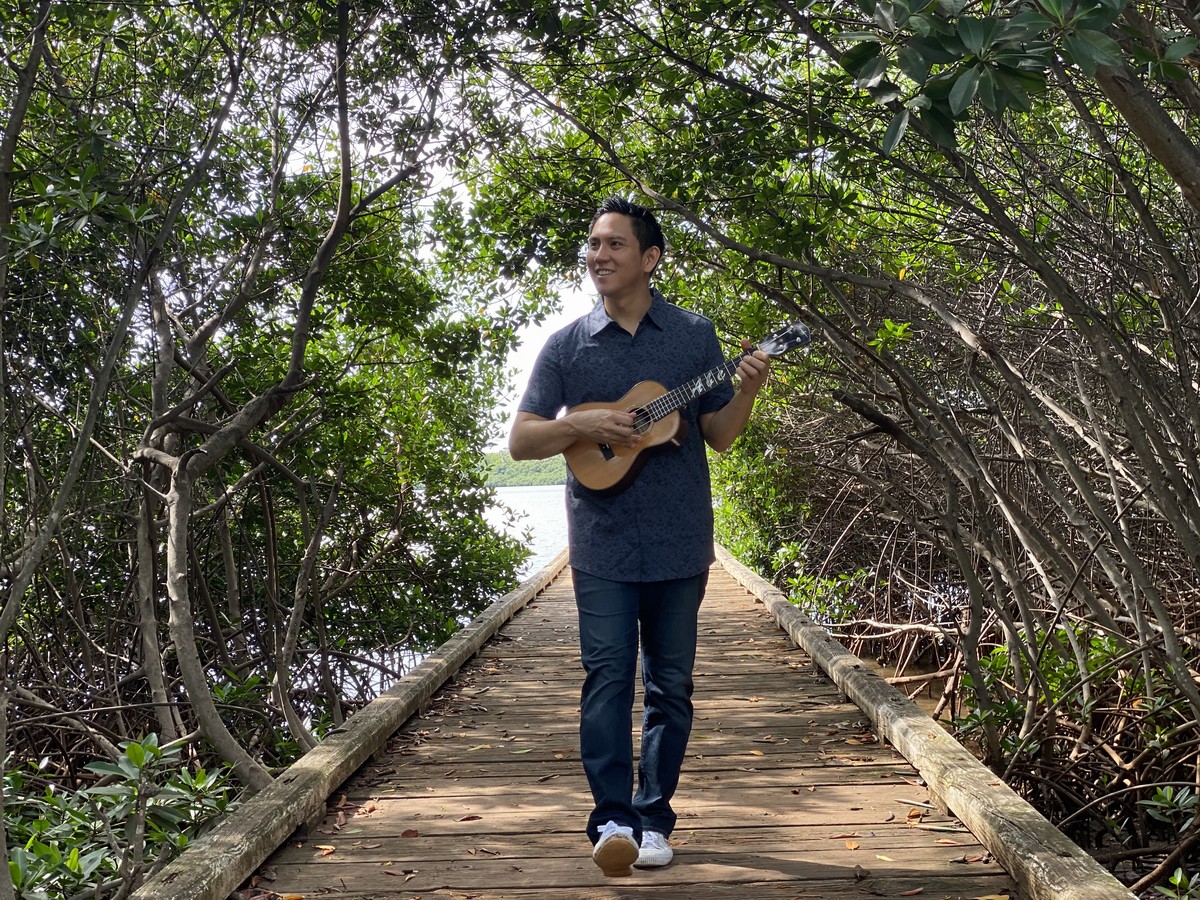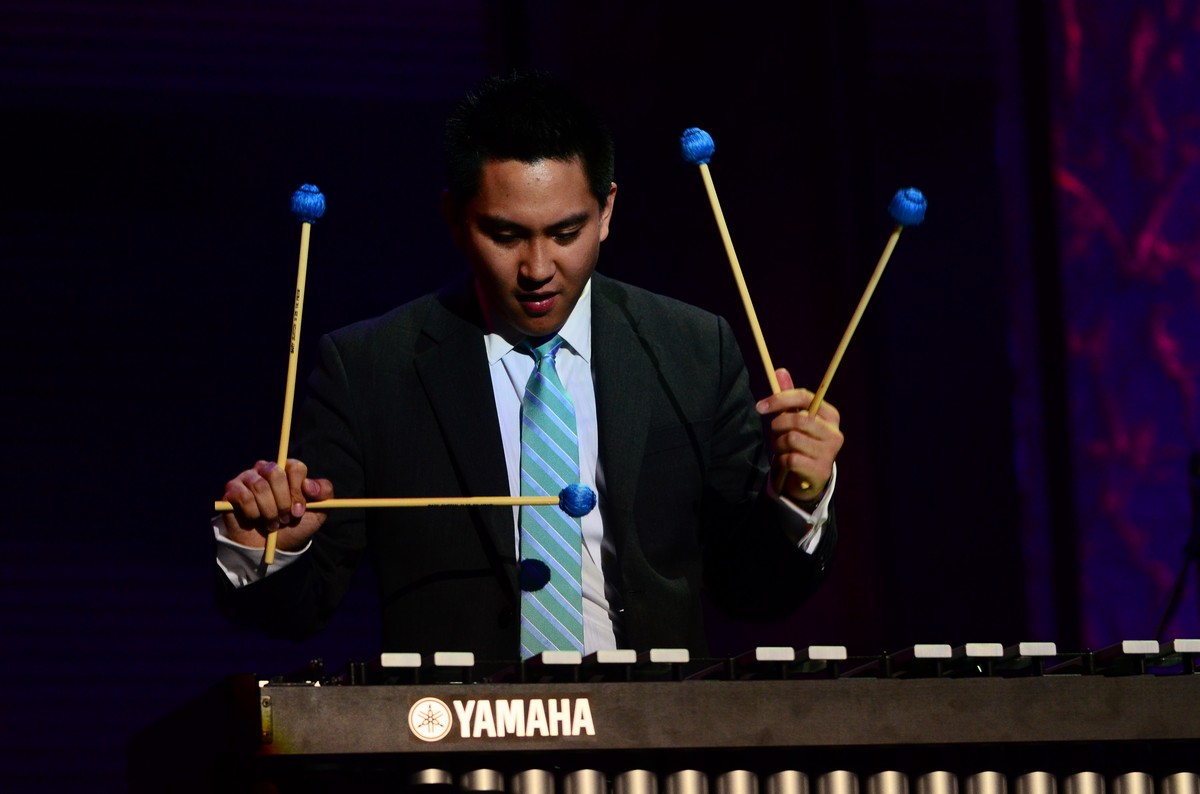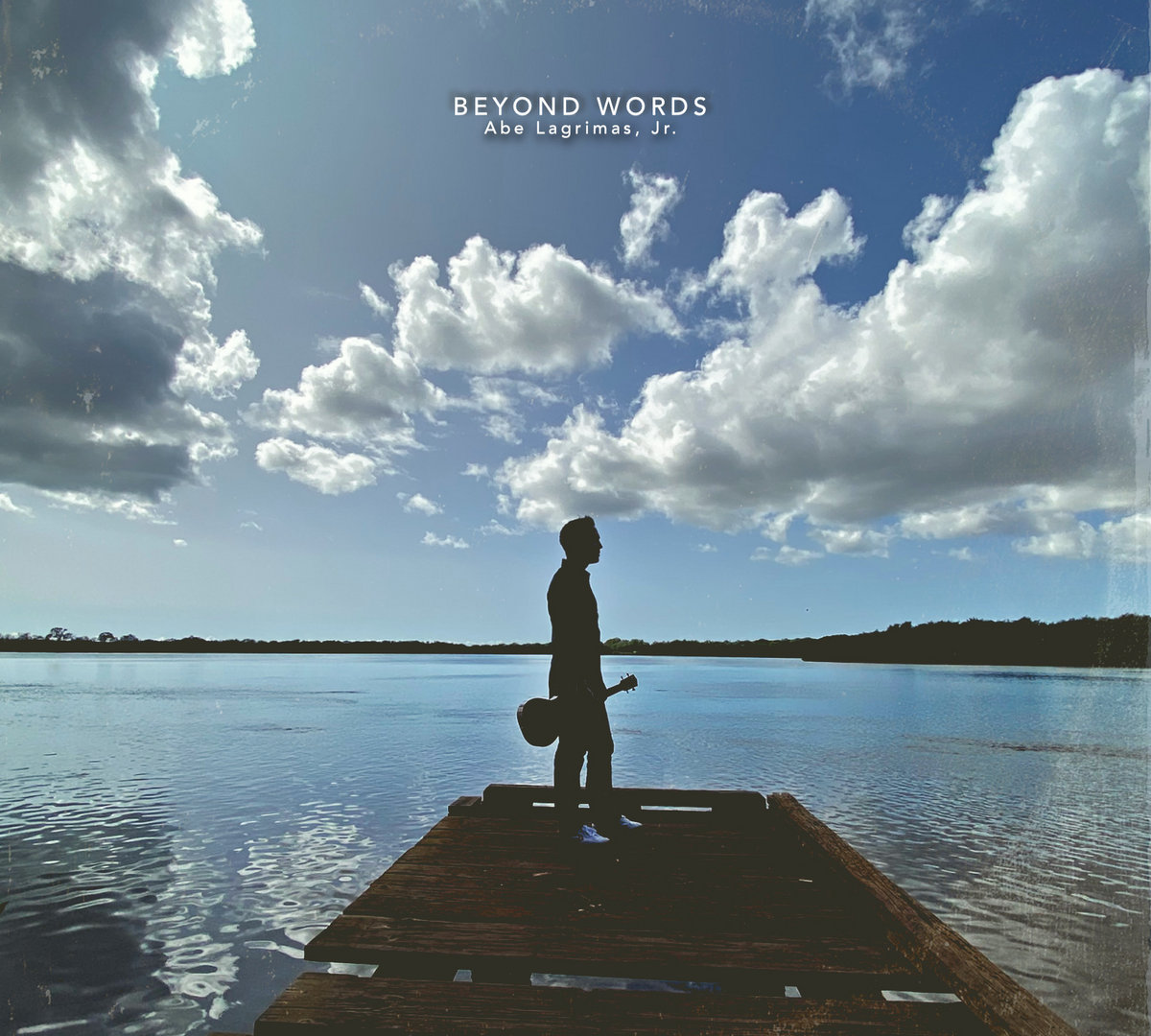A magyar változat megnyitása. / For the Hungarian version please click here.
I saw Abe in a YouTube-video about 10 years ago, and I said to myself: "Wow that guy's just amazing." I would have never thought that I could make an interview with him someday. And that day came.

Abe's fingerstyle playing and technique is simple perfect, he plays great jazz, I can't listen to him enough. It's clear that he mastered not only how to move his fingers accross the ukulele, but the he knows the music theory flawlessly.
Please introduce yourself in a few sentences!
Aloha Tom and thank you so much for this opportunity to be interviewed by you. I'm very excited for the Hungarian ukulele community to learn more about me. My name is Abe Lagrimas, Jr. I was born in Guam, raised in Hawaii, and now live in Los Angeles, California. I graduated from Berklee College of Music in Boston, Massachusetts with a degree in Music Education. As a musician, recording artist, composer, educator, and author, I perform professionally on the drums, ukulele and vibraphone.

How and when did you meet ukulele for the first time? What was the inspiration for you to learn ukulele?
I grew up in Hawaii so I was surrounded by the sounds of the ukulele, but I first picked it up myself in 2003 while I was attending Berklee College of Music in Boston, Massachusetts. Even though I was a drum set principal student at Berklee, I started to play the ukulele simply because I was feeling rather homesick and so the ukulele made me feel a bit closer to home.
Do you remember what was the first chord you learned? And the first you learned and thought "gee, that’s difficult"?
I don't remember exactly but it was probably C. I grew up playing the guitar so when I started to learn chord shapes, I thought it was much easier to play than the guitar. That may have been one of the reasons why I continued to play. At Berklee, I was fully immersed in jazz, so my immediate approach to playing the ukulele was in the jazz direction.
As far as I know your favorite music genre is jazz. I love jazz too, and I’m really excited to make this interview with an ukulele player who plays jazz at very high level. How did you meet jazz, and what does jazz mean to you?
My drumming brought me to jazz. Growing up, I listened to a lot of rock and heavy metal. Some of my favorite bands are Metallica, Slayer, and later Dream Theater. As I studied and learned more about drumming, I was turned on to jazz by my drum instructor and band director in school. It took me a while to appreciate jazz but once it clicked for me, I completely fell in love with it. I then started gigging professionally playing jazz with some of Hawaii's top musicians while still a high school student. That was some of the best jazz education I have ever received. To me, jazz allows the musicians to fully express themselves more than any other style of music through improvisation and the pursuit of a unique and original identity.
What is your favorite number to play and why? If you have more, don’t hesitate to talk about them all!
I don't really have a favorite piece of music, rather I enjoy playing through songs of varying styles, tempo, and using different techniques (strumming, fingerpicking, chord voicings etc.).
Is there any song you play and you say that it is technically really difficult?
I recently posted a video of me playing Benny Chong's arrangement of the jazz standard "The Way You Look Tonight". It's a very difficult piece because the entire thing is a chord melody arrangement. For me, most of these chord shapes are not too difficult but what does make it difficult is having to smoothly transition from one chord shape to the next while maintaining a steady tempo.
How do you practice? What do you practice? Do you practice every day? How long do you practice? Please tell us everything about your practice methods.
Honestly, I don't have a routine practice regimen but I do play regularly. I'm practicing my new original songs from my latest album "Beyond Words", reviewing older compositions so I don't forget how to play them  , and continuing to improve my improvising, both single note lines and chord voicings a la Benny Chong.
, and continuing to improve my improvising, both single note lines and chord voicings a la Benny Chong.
How many numbers are there in your repertoire? How fast does it grow? How do you keep yourself up to date with every song you play?
I've lost count, but it's because I don't keep track. Usually, I just review the songs I am going to play for an upcoming concert. And because each performance is different, I put together a set of music that would be best for each show. It's not a very long list of songs, I'd say about two dozen.
Maybe you don’t know, but I’m a fan of yours for about 10 years now. Check your video from 2011.: "Ukulele Blues" – there are my comments from 2011, 2017 and this year. This video caught me so much, I found it so astonishing that I wrote a blog post on ukulele.hu about it. Could you please tell us something about that number you play in that video please?
Wow, that is such an old video and I'm cringing at my playing, but I'm happy you like it. This is an impromptu jam of my original tune called "Blue-kulele" with my friend Gary Wicks playing the Kala U-Bass. This song can be found on my album Rhythm & Uke.
Lately I discovered your fingerpicking cover of Autumn Leaves which is one of my favorites jazz standards. Your rendition is just amazing, well placed chords, tasty solo, and it seems to be very difficult for me at least. Could you tell us something about this cover? E.g. how long did it take to learn this?
Autumn Leaves is one of the first jazz standards I ever learned not just on the ukulele but even back when I was starting to play jazz drums, so I've been quite familiar with the chord changes for some time. With this performance, I approached it just like any other jazz tune where I start with the melody and improvise over a few choruses. I tried to focus more on soloing using chords but there are some phrases where I use single note lines. For me, it's a fun and very familiar tune that I can always go back to and continue challenging myself on.
Checking your videos and background info I found that you play not only ukulele but other instruments as well. Could you please tell us about it? What other instruments do you play? When did you start to learn each instrument? And which instrument do you like the best?
I started playing the drums at age 4, casually was playing the guitar when I was in elementary school, vibraphone and piano when I was in high school, and then picked up the ukulele in college. I've been playing the drums the longest so that will always be my favorite instrument. It is also what I'm most comfortable on. Playing other instruments like the piano, vibraphone, and ukulele, allows me to focus more on melody and harmony, which actually helps me quite a bit as a drummer.
How many albums do you have? What are the themes of each album?
- Dimensions (2005). My debut album, features all original ukulele compositions with full band.
- A Pass Out Records Christmas (2007). My arrangements of popular Christmas songs, both vocal and instrumental. I played all of the instruments (ukulele, drums, vibraphone, bass, guitar, keyboard, percussion). Vocals by Traci Toguchi and Sherry Shaoling.
- Ukulele Vibes (2009). A duo album of ukulele and the vibraphone, both played by me. At the time, I came up with the concept because I was listening to a lot of duo albums and was intrigued by the interplay between two instruments. I believe the sound of the ukulele and vibraphone really complement each other so I composed original music specifically for the two instruments.
- Solo Ukulele: The King of Pop (2010). This EP was a tribute to the king of pop, Michael Jackson. I took upon the challenge to see if his music could translate over to the ukulele. It also features my ukulele friends Kalei Gamiao, Jason Arimoto, and Chris Salvador, and won a Na Hoku Hanohano Award that year.
- Rhythm & Uke (2014). This album features five solo ukulele pieces, and five other pieces accompanied by acoustic bass and drums. It highlights the ukulele in a small group trio setting.
- Abe Lagrimas, Jr. self-titled (2018). To me, this album is sort of re-introducing myself as a multi-instrumentalist and solo artist. The compositions are more complex, jazzy, and I also worked with a higher budget due to a Kickstarter campaign.
- Elua: Ukulele & Slack Key Guitar (2019). A compilation album of five ukulele pieces and five slack key guitar pieces by Lance Takamiya. The songs I composed are all inspired by Hawaii and Hawaiian music.
- U3 In Waves (2020). U3 is a ukulele super group of members Cynthia Lin, Lenny San Jose aka Ukulenny, and myself. The album feature a mix of popular covers and originals with an island and jazzy vibe. I contributed ukulele, vibraphone, drums, percussion, vocals, and arranged all of the songs.
- Beyond Words (2021). An album of ukulele and jazz originals where all of the instruments were recorded remotely due to the pandemic. In these compositions, I focused more on writing instrumental music with melodies that have the feel of a song with lyrics.
I’ve just learned that you released your new album: "Beyond Words". Could you please tell us about it in details? What instruments do you play on the records?
On "Beyond Words", I played all of the drums and ukulele, the vibraphone on two tracks, and then played bass and keyboard on one track. I also feature my L.A. musicians, Will Brahm on guitar, Sezin Ahmet Türkmenoğlu on bass, Matt Politano on piano, and lastly DeShannon Higa from Honolulu, Hawaii plays flugelhorn on one track. The album was made during the latter half of 2020 in the middle of a pandemic so most recording studios were closed. I thought it would be a fun and unique project to create an album where all of the musicians recorded their own parts separately in their own home recording setups. Basically, none of this music was ever rehearsed or performed together as a live band.

We talked about mostly of jazz and your albums. But I am really curious about other music or bands you like. Could you name some bands, performers from 1950s-60s-70s or even from later decades please. Maybe classical music? Just a few of them maybe naming your favorite songs too. Do you please these songs on ukulele too?
When it comes to jazz, I'd say the 50s and 60s are my favorite. I love the groups of Miles Davis, John Coltrane, Art Blakey and the Jazz Messengers, Wayne Shorter, Herbie Hancock, I can go on and on. With rock, obviously the Beatles, but Led Zeppelin is probably my favorite classic rock band. I just love the way John Bonham played those drums. As I mentioned earlier, I grew up listening to a lot of Metallica, Slayer, Pantera, then later got into Rush and Dream Theater. I started actively listening to classical and orchestral music during the pandemic and really got into the music of Shostakovich. This would turn me on to check out other composers like Stravinsky, Beethoven, and Mahler. One of the main reasons why I wanted to listen to classical more was to be inspired. Jazz allows for true self-expression, but classical music has so many more layers of colors, textures, moods, and harmony. The world of classical music is a vast resource for musical inspiration, experience and education.
The Hungarian ukulele community is not too big, but I hope, it’s growing. We are working on making ukulele well known in Hungary, and we are trying to spread the "joy of ukulele". What is your message for those who are thinking about starting to learn to play ukulele?
One of the great things to come out of the pandemic is that it allowed for most of us to realize how much music is essential in our lives. Playing the ukulele or any musical instrument heals us and is food for the soul. And when you play with others or share your music with others, it feeds their soul and well. Play the ukulele, play with others (safely of course), and have fun. Do this, be kind to one another, and the world will be a little bit of a better place.
Thank you so much for the interview.
Thank you too  .
.
Abe's website to purchase his music, books, other merchandise, and live shows/streams: https://www.abelagrimasjr.com/
Instagram: @abelagrimasjr
Facebook: https://www.facebook.com/abelagrimasjrmusic/
YouTube: https://www.youtube.com/abelagrimasjr
Az ukulele.hu-n minden blogbejegyzés (írott szöveg, képek, videók, hanganyagok) szerzői jogi védelem alá tartozik, ezért a blogbejegyzések többszörözése, terjesztése, másolása, átdolgozása és bármilyen egyéb felhasználása kizárólag a szerző előzetes írásbeli engedélyével lehetséges. A blogbejegyzések internetes címének (linkjének) közösségi oldalakon vagy más honlapokon történő megosztására ez a korlátozás nem vonatkozik, sőt megköszönjük, ha a bejegyzés linkjének terjesztésével az ukulelézést népszerűsíted:
https://ukulele.hu/blog/interview-with-abe-lagrimas-jr
